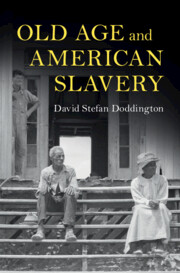Book contents
- Old Age and American Slavery
- Cambridge Studies on the American South
- Old Age and American Slavery
- Copyright page
- Dedication
- Contents
- Figures
- Tables
- Acknowledgments
- Introduction
- Part I The Enslaved
- Part II Enslavers
- 7 “Old God damn son-of-a-bitch, she gone on down to hell”
- 8 “They are getting too old and weak”
- 9 “Something must be done with the old man”
- 10 “Let our women and old men … be disabused of the false and unfounded notion that slavery is sinful”
- Conclusion
- Bibliography
- Index
8 - “They are getting too old and weak”
Aged Mastery and White Conflict
from Part II - Enslavers
Published online by Cambridge University Press: 27 October 2023
- Old Age and American Slavery
- Cambridge Studies on the American South
- Old Age and American Slavery
- Copyright page
- Dedication
- Contents
- Figures
- Tables
- Acknowledgments
- Introduction
- Part I The Enslaved
- Part II Enslavers
- 7 “Old God damn son-of-a-bitch, she gone on down to hell”
- 8 “They are getting too old and weak”
- 9 “Something must be done with the old man”
- 10 “Let our women and old men … be disabused of the false and unfounded notion that slavery is sinful”
- Conclusion
- Bibliography
- Index
Summary
This chapter shows how the push for profit and dominance, and the dynamics of slavery, affected white southerners’ dealings with elderly “masters.” As enslavers aged, they could be forced to fight against the rising generation who looked at them and saw dependency and submissiveness, instead of autonomy and mastery. These traits – and general binaries of power/powerlessness – were understood as bound up with the racializing discourse of slavery and the gendered dynamics of patriarchy. Elderly enslavers – both men and women – sometimes came to believe that advanced age was a relation of powerlessness that marked them as closer to enslaved than enslaver and which served to unsettle existing power relations in the community. Those who fought against such depictions confronted communal perceptions of their inability to enact mastery, and these battles had particular emotional effects. Cross-cultural scholarship argues that communal assumptions of incapacity can be humiliating, and this chapter emphasizes how aged enslavers grappled with these perceptions. These old slavers are not objects of pity, but their experiences reveal the culture of exploitation that drove antebellum slavery.
Keywords
- Type
- Chapter
- Information
- Old Age and American Slavery , pp. 251 - 288Publisher: Cambridge University PressPrint publication year: 2023

